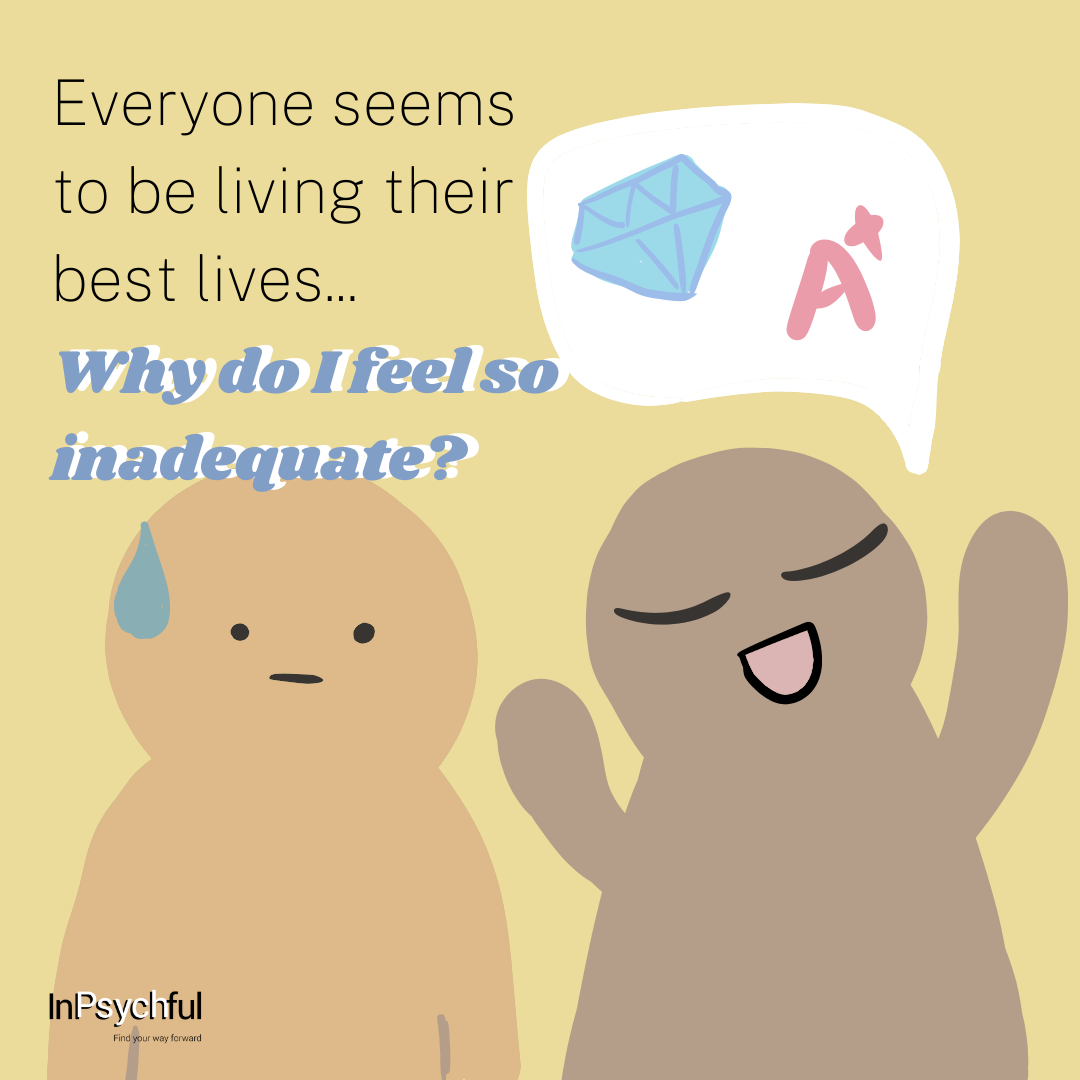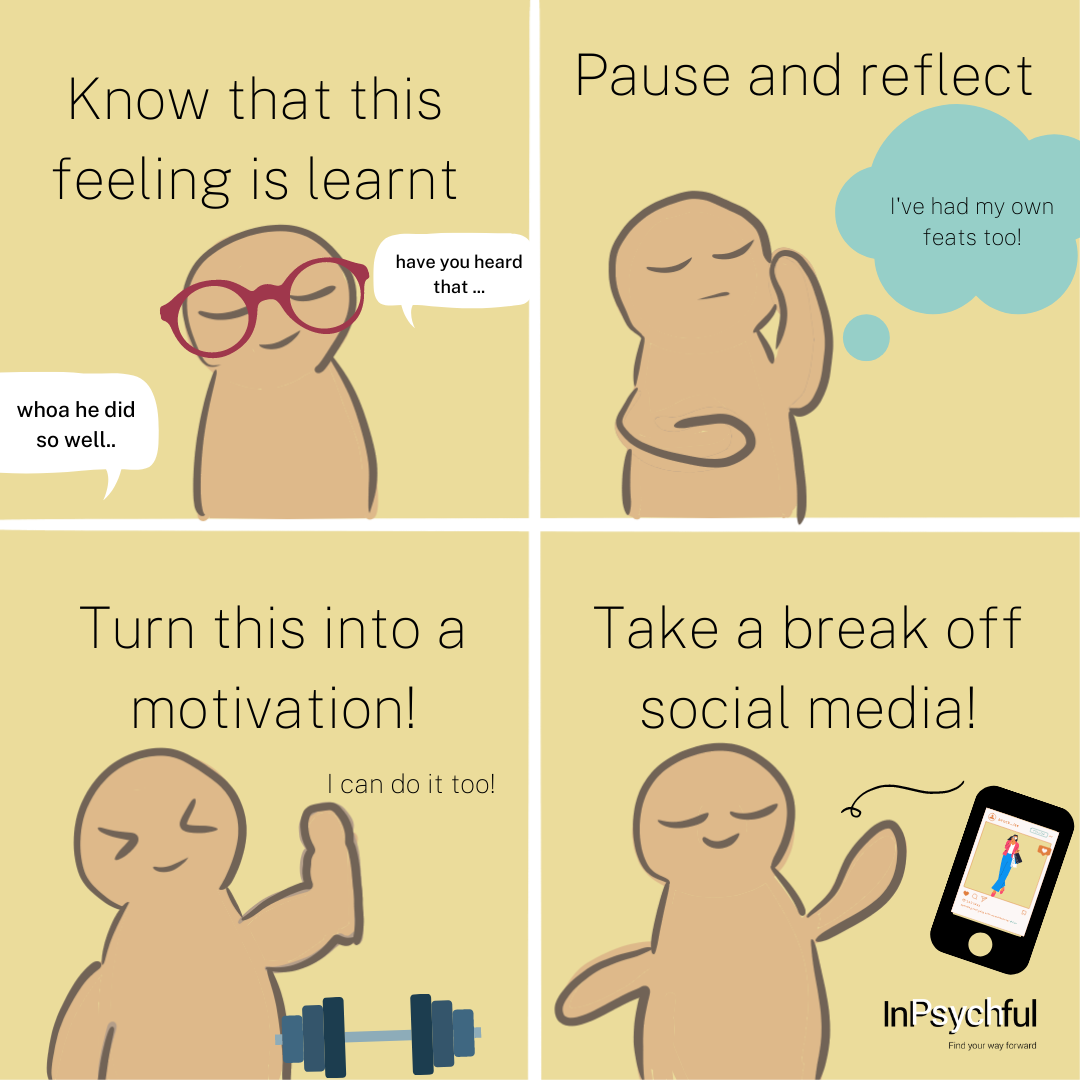“You will never be good enough”. This was an important scene in Crazy Rich Asians, where Eleanor (the mother from the rich family) confronted Rachel (main female lead whose background is less well-off) about how she does not fit into the family and will not be able to reach their family’s standards . While most may not encounter such confrontations in real life, there seems to be a parallel in terms of how some of us view the world. Sometimes, we feel like we are just not good enough in what we are doing to meet the standards of the society.
Recall a time when you were first told that you were not good enough. Perhaps, it was not explicitly mentioned, but as you grew up, you could have felt that others were performing better than we are. This can start as early as our childhood or in our teenage years. How has these thoughts shaped your perceptions over the years?
Thoughts about how – “I should be getting an internship”, “I should be getting a pay raise”, “I need to do this, and I need to do that” may creep into our minds now and then. As we scroll through our social media feeds and converse with our friends, some of us inevitably perceive that certain individuals seem to be more successful than we are. As a result, we feel bad about ourselves and wish that we were in their positions. While these thoughts can be motivating in spurring some of us to do better and progress in life, for others, too much of such thoughts can become overwhelming and highly stressful.
Why do I feel this way?
Various life experiences could have led us to feel inadequate in some way (Hendel, 2018). We start to learn and observe that others perform better than ourselves. It is probable that as a result, we have a lower self-worth. A quick look at the social comparison theory that was developed by Festinger tells us that it is intuitive for us to analyze ourselves with reference to others (Cherry, 2020). There are many factors that leads to comparison with others such as, grade comparisons in schools, needing to hit the Key Performance Indicators (KPIs) at work, societalexpectations such as when to get married, reasons for remaining single, career progression. Productivity seems to be the primary focus of our society today and sometimes this can make us feel guilty when we are not actively engaged in tasks.
Social media perpetuates these feelings of inadequacy as users post their best moments showing that they are doing well in life. A study found that a person’s self-esteem is lower when one views a profile showing that they are doing better (Vogel, 2014). However, what we are not seeing are people’s struggles and failures and which are less shared and conveyed because of worries of the consequence of sharing these vulnerable thoughts (judgement from others, worries about being outcasted) (BBC, 2018). Hence, it would be rather unfair that we are comparing other people’s outsides with our insides.
You may have noticed that some of your close friends may share similar struggles and experiences that you may have had. As we share about our thoughts and experience to more people we trust, we may find out that many of us feel the same way about ourselves too.
At the end of the day, we may not be as inadequate as we think we are.
I don’t really like the feeling of being inadequate… but what can I do to combat it?
Recognising that this feeling is learnt: What we can do to help address these feelings is to recognize and remind ourselves that this feeling of inadequacy is learnt from our environment and although it seems very real to us, this is not a fact (Hendel, 2018). This feeling of adequacy does not define us and when we start to realize that this feeling is learnt, we are then able to distant ourselves from these thoughts and reduce its weight on our shoulders. Think about the times when you were able to handle challenges and persevere through difficult times, what were the reasons that you were able to manage the situation? It could be your skills, like your ability to problem-solve and adaptability, or even your traits, like remaining calm in that scenario. Looking at these situations in retrospect can help us view ourselves from an alternative perspective – as someone with adequate skills and commendable characteristics.
Pause and Reflect: We can also acknowledge that we have done a lot in our lives and give ourselves credits for our hard work. As dwellers living in the fast-paced society, we are used to keeping our eyes on the goals set and the upcoming tasks. We rarely pause to look back at what we have done thus far and thank ourselves for accomplishing them. Take some time to pause and reflect on what we have accomplished and although this may sound weird, thank yourself for it.
Use comparison to drive yourself: Humans tend to desire what others have and at times this can put unnecessary amounts of pressure on us. We can harness this desire and turn them into a motivation to improve on various aspects of ourselves. Through asking ourselves what is worth admiring in the other person and how you can channel this into a way to make yourself a better individual (Haas, 2018).
Take a break off social media: By now, we would have understood how others’ flawless façade on social media can bring about lower self-esteem. Instead of spending our time looking through our social media feed, why not try other activities to relax and enjoy ourselves? This can be done through learning something new, doing your favorite hobbies!
Ultimately, we are not alone in experiencing this feeling of inadequacy, rather, it could be more common than we think! While some levels of comparisons may spur us into improving ourselves, letting those thoughts consume us may affect us negatively. Let us slow down and recognize that what we have done so far is laudable. By recognizing that our thoughts about inadequacy is different from our self-worth and reflecting on the evidence that shows ourselves being capable, we will eventually find out that we are indeed adequate and enough.
Camellia Wong., MA, Tan Khai Teng
More Articles
References
Vogel, E. A., Rose, J. P., Roberts, L. R., & Eckles, K. (2014). Social comparison, social media, and self-esteem. Psychology of Popular Media Culture, 3(4), 206–222.
Haas, S. B. (2018, Mar 5). How to Stop Comparing Yourself to Others. Psychology Today. https://www.psychologytoday.com/sg/blog/prescriptions-life/201803/how-stop-comparing-yourself-others
Hendel, H. J. (2018, May 20). Why Do I Feel So Inadequate? Psychology Today. https://www.psychologytoday.com/blog/emotion-information/201805/why-do-i-feel-so-inadequate
Mental Health: Why is it hard to talk about problems?. (2018, Dec 5). NewsRound.https://www.bbc.co.uk/newsround/46425575
Cherry, L. (2020, Sep 20). Social Comparison Theory in Psychology. Verywell Mind. https://www.verywellmind.com/what-is-the-social-comparison-process-2795872


